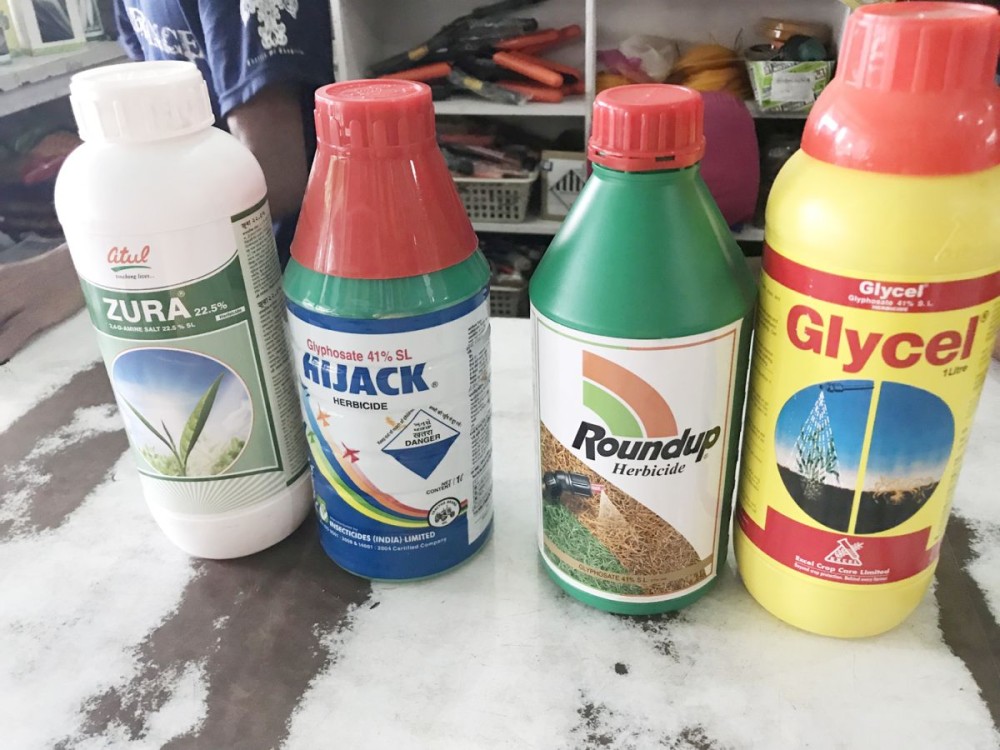Various herbicides are available over the counter in Nagaland without any monitoring, leading to their indiscriminate use in the State. This gives rise to the question if Nagaland’s agricultural produce can automatically be termed ‘organic’ anymore. (Photo by Abokali Jimomi)

In Nagaland, ‘local’ produce can no more automatically be classified as ‘organic’
Abokali Jimomi
Dimapur | August 12
Public food safety debate is taking a healthy and powerful turn in Nagaland, thanks to the recent exposé of the formalin-laced fish business. It is also encouraging that the Nagaland State Government aims to promote organic farming stressing on socio-economic self-sufficiency, conservation and preservation of natural resources, planning for conversion to an ‘Organic State,’ as the Chief Minister announced in June 2018.
With the hope for effective planning and policies for use of resources- land, water, soil, wildlife, air and forests- some reality checks are needed if what is planned is to be implemented.
Organic by default?
‘Organic by default’ is a tagline usually attached to agricultural produce from the North East, especially when exhibiting outside the region. Given our farming history, the tag held true perhaps a decade ago. However, the farming scenario has changed in the recent years.
Availability and easy access to chemicals, pesticides, herbicides and the lack of regulation and monitoring for application to the soil, crops and water ways have altered how we produce food today. ‘Local’ is great but does not automatically qualify as ‘Organic’ anymore, especially with pesticide residue in the food we produce.
“The most effective weedkiller is Roundup (Herbicide), most villagers in this region use it,” says a village headman about weed control in his village farms. “It has been about 10 years since we have been using it to kill weed in paddy fields and orchards. Many people spray it around their lawns and roadsides, and on the way to the farms... it kills vegetation like forest fire.”
“There are other types of weedkillers and chemicals that people use especially for paddy cultivation in the hilly region... farmers are also using another chemical these days which destroys weed, applied to the water source and to the wet paddy fields,” he informs.
When asked about the procedure for application, and if appropriate gear is used, he explains, “I don’t know of anyone using protective clothing; I have only used it once myself ... spread it around without a mask or gloves.”
Another farmer says, “Roundup is sprayed on the edges of the terrace paddy fields and around our mature citrus trees. Almost every paddy cultivator uses it these days.”
What is Roundup?
The primary ingredient of ‘Roundup’ is glyphosate, a non-selective herbicide for killing any plant. It is produced by agrochemical giant Monsanto. According to Fortune.com, this global top-selling weedkiller, Roundup, brings annual revenue of $4.8 billion to Monsanto. In 2015, the World Health Organization’s International Agency for Research on Cancer classified glyphosate as “probably carcinogenic to humans.”
Landmark Monsanto’s Roundup Lawsuit
Dewayne Johnson vs. Monsanto Company was the first Roundup cancer lawsuit to proceed to trial. Johnson developed non-Hodgkin lymphoma and alleges that the cancer was due to his repeated exposure to Roundup, as his job was to apply the herbicide to school lawns and garden. Johnson has been given about six months to live by his doctors and therefore, was the first to go to trial. On August 11, CNN reported, “the jury at the Superior Court of California in San Francisco awarded Johnson $250 million in punitive damages and about $39 million in compensatory damages.”
More than 800 cancer patients were suing Monsanto for Roundup giving them cancer according to CNN, and a Reuters report in July 2018 said Monsanto faces 5000 lawsuits in state courts of the US alleging Roundup caused cancer.
In India, the sale and use of pesticides is not well regulated. In November 2017, 48 farmers died in Maharashtra and over 700 hospitalised because of pesticide poisoning. The chemical monocrotophos, which is banned in over 60 countries but still sold in India, was said to be the cause of the deaths.
In Nagaland, the sale and use of various chemicals and weedkillers are unregulated. Anyone can buy any chemical off the shelf and use it as one pleases, without guidance about usage and dosage, and without monitoring.
It is a hard pill to digest that these residues are in the rice, vegetables and meat we eat today. Nagaland State requires stricter regulations and monitoring at all levels of food production; more awareness that will correspond with the State’s food safety and environment safety ambitions and ‘Organic’ goals.






